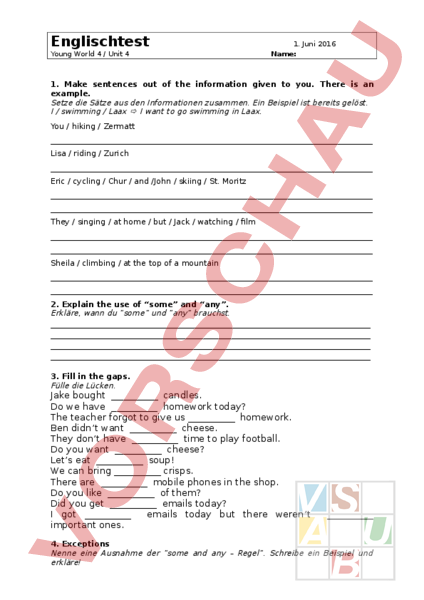Arbeitsblatt: Test Unit 4
Material-Details
Test über Unit 4 mit Zusatz (irregular verbs mündlich im past tense)
Englisch
Gemischte Themen
6. Schuljahr
4 Seiten
Statistik
161897
1171
42
10.06.2016
Autor/in
Saskia Gantenbein
Land: Schweiz
Registriert vor 2006
Textauszüge aus dem Inhalt:
Englischtest Young World 4 Unit 4 1. Juni 2016 Name: 1. Make sentences out of the information given to you. There is an example. Setze die Sätze aus den Informationen zusammen. Ein Beispiel ist bereits gelöst. / swimming Laax want to go swimming in Laax. You hiking Zermatt Lisa riding Zurich Eric cycling Chur and /John skiing St. Moritz They singing at home but Jack watching film Sheila climbing at the top of mountain 2. Explain the use of some and any. Erkläre, wann du some und any brauchst. 3. Fill in the gaps. Fülle die Lücken. Jake bought candles. Do we have homework today? The teacher forgot to give us homework. Ben didnt want cheese. They dont have time to play football. Do you want cheese? Lets eat soup! We can bring crisps. There are mobile phones in the shop. Do you like of them? Did you get emails today? got emails today but there werent important ones. 4. Exceptions Nenne eine Ausnahme der some and any – Regel. Schreibe ein Beispiel und erkläre! 5. You have to write possible form with some- or any- on the line. Fülle die Lücken mit einer passenden Form von some- und any-. (some, any, somebody, anybody, something, anything, somewhere, anywhere) There isnt speaking on the phone. This is place in Zurich. happened to him yesterday. Do we know about his problems? There arent bears in the Alps. Do you know who is member of Swiss band? Hotdog is to eat. Do you know about this speciality? 6. Read this text and fill the gaps with the missing word. You can find list of words at the bottom of the text. Two words are left over. Fülle in diesem Lesetext die Lücken. Die Wörter findest du in der Liste. Achtung: zwei Wörter werden nicht gebraucht. Every year of tourists from all over the world come to visit the Swiss Alps. Some them want to go skiing, others go climbing or hiking and some come because they have never seen before. Lots of these speak English. Thats why most people who live and in one of the famous tourist resorts, such as Zermatt, Davos, St. Moritz or Wengen have to English. And they often need to know other, too! Meet some of the visitors. Look at the pictures and find out why these tourists come to . Now listen to what they say. Switzerland, of, hundreds, work, sun, snow, languages, tourists, speak, up 7. Read the text Nanas Book and tick the correct sentences. Lies den Text „Nanas Book und kreuze die korrekten Sätze an. The name of the story-teller is Neil Harmer. Hes very excited because hes got the chance to interview his grandmother. There are still men working in the coal mines. dry ski run is the same as skiing on water. Nana calls her grandson pet. Her favourite book is „Schellen Ursli. Nanas still dreaming of travelling to Switzerland. Nana has once been to Switzerland when she was young. She loves her village very much. There is competition about the dry ski run in the newspaper. The winner receives three tickets to Switzerland. Nanas grandson doesnt win the competition. Nana and her grandson will soon travel to Switzerland. 8. Translate the sport activities. Übersetze die Sportaktivitäten. Schlitteln Fahrradfahren Skifahren Schwimmen Fischen Schnorcheln Reiten Gleitschirmfliegen Klettern Wandern 9. Past tense. Deine Lehrperson fragt dich nach 10 Verben von deinen Lernkarten, die du zuerst in die Grundform und danach ins Past tense setzt. 10. Zusatz: Writing – The call of the Alps Take an extra sheet and write postcard to Brett from Australia. Youve met him in St. Moritz! Read the text carefully before you start. If you have time left, you can colour the postcard. Nimm ein Extrablatt und schreibe Brett aus Australien eine Postkarte. Du hast ihn in St. Moritz kennengelernt. Lies den Text sorgfältig durch, bevor du startest. Wenn du noch Zeit hast, kannst du die Postkarte ausmalen. Punktetotal: Erreichte Punktzahl: Lernziel: Unterschrift eines Elternteils:
